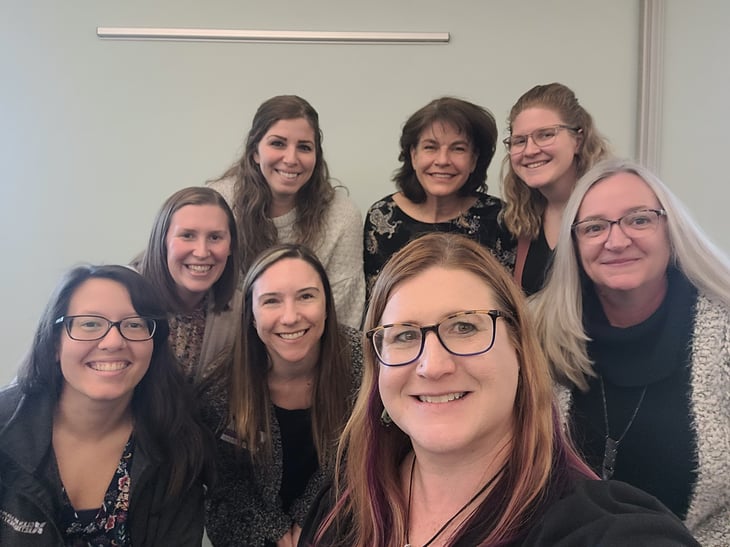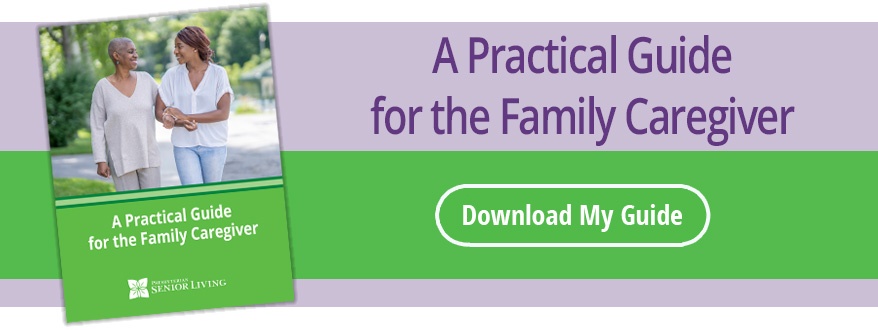
Five Ways Social Workers Promote Wholeness of Body, Mind, and Spirit
Caregiver Support | Miscellaneous
Updated from the original publication on March 23, 2023.
Quality of life is a top priority for those who serve residents at Presbyterian Senior Living.
March is Social Work Month, a time to celebrate those who help create and advocate for improved quality of life. At Presbyterian Senior Living, social workers play a vital role in uplifting seniors in every area of their lives.
 Pictured above is Alicia Fenstermacher with other PSL social workers.
Pictured above is Alicia Fenstermacher with other PSL social workers.
Alicia Fenstermacher, LSW/MSW, NHA, CDP, Vice President of Purposeful Living at Presbyterian Senior Living, has experienced the importance of social workers from the perspectives of the recipient as well as the professional.
She learned about geriatric social workers in high school when her grandmother began showing signs of dementia. Alicia and her family dealt not only with the medical struggles associated with the condition but with the social and emotional difficulties that her grandmother and her family were experiencing.
“When I got to college, I knew I had to do something in a helping profession,” Alicia says. “Social work was the right fit.”
Alicia has been a social worker since 1999 and has worked in aging services all of her career. She joined Presbyterian Senior Living in 2005. Since then, she has seen the power of social workers to transform the quality of life of Presbyterian Senior Living residents who are going through some of life’s toughest struggles.
Alicia shared her insights about five ways that social workers at Presbyterian Senior Living help foster a better quality of life.
1. Educate Residents and the Community
As the Vice President of Purposeful Living, Alicia provides support to all of Presbyterian Senior Living's communities for every aspect of quality of life. This includes overseeing chaplaincy, fitness services, memory support, social work, community life, resident empowerment, customer satisfaction, and anything else that helps people get out of bed and move forward.
“Our goal is to make aging as important as everything else in society and reduce ageism,” Alicia says. “We also want to ensure that residents and their families have the understanding and education about options available to them when they need it most.”
2. Alleviate Anxiety and Depression
Transitioning to and going through the golden years of life come with a unique set of anxieties. Social workers at Presbyterian Senior Living often help individuals adjust to life after an acute or chronic health issue. They work to alleviate depression and anxiety and ensure that psycho-social needs are met.
“We work with all team members to help them understand the emotional and social needs that someone may have so that they’re having a full focus on the individual, not just one or two aspects of life,” Alicia says.
3. Navigate Transitions
Presbyterian Senior Living personnel have social work and social services experience in health care and nursing home settings, as well as in assisted and independent living communities.
“If you look at our mission statement, ‘To provide compassionate, vibrant, and supportive communities and services to promote wholeness of body, mind, and spirit,’ that right there is basically the same thing as social work,” Alicia says.
Her goal is to help residents holistically live their lives from one season to the next.
The Social Work team also handles discharge planning, making sure that seniors have the resources they need to live their best lives, whether going home or to a nursing home. Social workers help people meet their goals, wherever they are.
4. Link to Resources
Through their hard work and dedication, social workers play a crucial role in meeting the needs of seniors in Presbyterian Senior Living communities.
When a resource doesn’t exist in a community, Alicia and her teams work to create it to make each life fuller.
“There is no two days that are the same,” Alicia says of being a social worker. “Every day is a completely different adventure. Every person you meet is truly their own individual self. We get to work with amazing individuals with amazing life experiences, an amazing today, and an amazing future. Helping make today good and tomorrow brighter is an amazing opportunity.”
5. Advocate for Seniors
Presbyterian Senior Living's commitment to comprehensively meet residents' needs is reflected in the roles of social workers and supportive service coordinators in its communities. Presbyterian Senior Living has 15 social service personnel, 12 of whom are social workers with extensive training and bound by a code of ethics. The other three talented social service team members bring education, training, skills, and strengths that complement and balance the team. This brings higher success to ensure that multiple perspectives are in place for success. PSL also has many other degreed and licensed social workers working in a multitude of departments such as Independent Living Resident Services Directors and other management positions.
The team of social workers at Presbyterian Senior Living also is active throughout the community. Kristie Jo King, LSW, CDP, who serves as President of the National Association of Social Workers, is a Presbyterian Senior Living employee and is constantly on the lookout for ways to better the quality of life for seniors. The culture of advocacy has a far-reaching impact on the community.
“Social workers are there for our residents and their families,” Alicia says, “to support them in their aging journey and help them successfully live their best life.”
About Presbyterian Senior Living
As the trusted leader in aging services, Presbyterian Senior Living combines over 95 years of experience with innovative approaches to senior communities and services. Across our 27 communities in PA, MD, OH, and DE, we serve over 6,500 seniors. We are committed to: FOSTERING teamwork and responsibility. UPHOLDING integrity in every action. EMBRACING innovation to create opportunities for everyone’s success. LEADING with compassion and respect.


